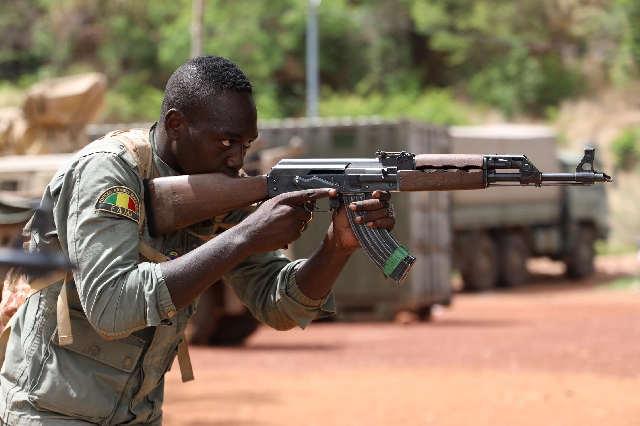The ripple effect of Mali’s counterterrorism efforts on neighbouring Mauritania
 Mali terrorists in action
Mali terrorists in action
A Historical Background: Counter-Terrorism in Mali
Mali has been grappling with terrorism and insurgency in the country’s northern regions for the past decade.
The root causes of the insurgency include historical grievances, ethnic tensions, and the spillover of armed groups from the Libyan crisis in 2011. In 2012, insurgent and jihadist groups in northern Mali unified, igniting an unprecedented crisis that spread into central Mali.
The turmoil prompted the intervention of French troops supported by Chadian forces, at the request of Mali’s government.
Mali also sought assistance from a European Union training mission to strengthen the Malian security forces. Additional support came from the United Nations, which authorized the establishment of an African-led International Support Mission in Mali (AFISMA).
This support mission soon transitioned to a UN-led mission, aimed at resolving the conflict. Despite these efforts, peace remains elusive.
France’s Military Operations: Operation Serval (2013) and Operation Barkhane (2014) have been central in supporting Mali’s counterterrorism efforts.
Operation Serval was initiated in response to United Nations Security Council Resolution 2085, adopted on December 20, 2012, along with an official request from Mali’s interim government for French military assistance.
This operation, aimed at countering Islamist militants, officially ended on 31 July 2014. Subsequently, it was succeeded by Operation Barkhane, which commenced on August 1, 2014, with a broader mandate to combat Islamist fighters across the Sahel region.
Operation Barkhane aimed to provide sustained support to Sahelian countries in their fight against terrorism, establishing a more permanent French military presence in the region with strategic bases in Niamey, Niger, and N’Djamena, Chad.
Operation Barkhane was the longest and most costly French military operation since World War II, it began in 2014 and was officially withdrawn in August 2023.
In the beginning, the operation yielded much success and extended permanent bases to other Sahelian states: Niger and Chad.
Despite its initial achievements in bolstering the Malian armed forces and leveraging advanced air and ground technologies, operation Serval ultimately fell short of its goals.
The continued presence of terrorist groups in the region and the significant loss of life, with thousands of Malian civilian and military casualties and over 2.5 million people displaced, highlight the limited success of the operation.
Several other operations (The G5 Sahel Joint Force, have supported the Malian state in its fight against terrorism, however, this extensive support has not succeeded in restoring stability to Mali, nor has it prevented the terrorist threat from spreading to central Mali and the wider region.
The situation in Mali has led to massive population displacements toward neighbouring countries, notably Mauritania, with economic, social, and humanitarian consequences.
Counterterrorism in Mauritania
Before 2011, Mauritania had suffered seventeen terrorist attacks, six of which were carried out in Nouakchott and claimed by the Salafist Group for Preaching and Combat (GSPC) and Al-Qaeda in the Islamic Maghreb (AQIM). The country has since not suffered a terrorist attack.
Mauritania has made significant efforts to combat terrorism and its threats.
The initial phase of its strategy focused on reinforcing state presence by providing aid and guaranteeing basic social services to discourage people from joining armed groups.
The second phase involved bolstering security measures to neutralize the jihadist threat.
This included creating nomadic Méhariste (camel cavalry) units.
The Mehari National Guard patrols remote areas bordering Mali for surveillance and to fight against active terrorist cells.
The Méhariste are also responsible for militarizing the border with Mali and monitoring roads through aerial surveillance and fixed security posts.
The third phase adopted a theological approach, establishing a political-theological dialogue between theologians and prisoners.
This comprehensive strategy has successfully dismantled several terrorist cells, and as a result, Mauritania has not experienced any terrorist attacks since 2011.
The Effects of Mali’s Counterterrorism Measures on Mauritanian soil
The border between Mauritania and Mali stretches for more than 2,000 km.
Mali’s counterterrorism measures have led to significant transboundary harm along Mauritania’s borders.
1. Displacement of Populations and Refugee Flows
Northern Mali had already seen a large influx of internally displaced people as a result of threats and attacks by JNIM and ISGS.
According to figures for October 2023, there are 391,961 internally displaced persons in Mali and 104,324 refugees in Mauritania.
Counterterrorism operations, particularly those involving military force, often result in the displacement of local populations. Civilians fleeing violence in northern and central Mali have crossed into Mauritania.
This influx of refugees strains Mauritania’s resources and infrastructure, leading to humanitarian challenges.
The establishment of refugee camps near the border has led to increased tensions. In southeast Mauritania, just 50 kilometres from the border with Mali, lies the Mbera refugee camp. According to United Nations High Commission for Refugees (UNHCR) data from October 2023, Mauritania hosts 112,021 refugees, 98.5% of whom were Malians (108,095).
Of these refugees, 51% were women and 54% were children (aged 0-17). 86,586 were registered in the Mbera camp, 1,313 were registered outside the camp, and 10,553 were awaiting registration. A total of 1,268 were registered in Néma (Southeastern Mauritania) and 5,732 were registered near Néma.
This makes Mbera one of the largest refugee camps in West Africa and the second largest in terms of the number of Malian refugees it shelters.
In 2012, when the war in Mali began, thousands of people fled to neighbouring Mauritania in search of the safety their country could not provide.
A decade later, refugees are still arriving at the camp. Although the war officially ended years ago, ongoing terrorist activity in the region is forcing thousands of people to flee to neighbouring countries every year, to live in peace.
These camps require substantial resources and security measures, sometimes causing friction with local communities and authorities in Mauritania.
2. Cross-Border Movements of Terrorist Groups
As Malian forces and their international partners target terrorist groups, these militants often relocate to avoid capture by crossing into neighbouring Mauritania.
This movement spreads the threat of terrorism across borders and leads to the recruitment and radicalization of local populations in Mauritania, further destabilizing and complicating regional security.
A travel advisory issued by the US Bureau of Consular Affairs in July 2023 stated that the government of Mauritania designates certain areas off-limits to foreigners and most Mauritanians.
These “No Movement Zones” are extremely dangerous due to their proximity to Mali, where armed groups engaged in an active insurgency carry out cross-border attacks into Mauritania.
3. Diplomatic Tensions
Cross-border operations that occur in pursuit of insurgents by Malian forces and their allies have sometimes resulted in operations that inadvertently cross into Mauritanian territory.
For example, French-led Operation Barkhane spillovers have occasionally seen Malian and allied forces crossing into Mauritanian territory, either in hot pursuit of terrorists or for logistical reasons.
These Security and Military incursions can undermine Mauritania’s sovereignty and lead to diplomatic fallouts.
Jihadist groups like AQIM and the Islamic State in the Greater Sahara (ISGS) also frequently move across the Mali-Mauritania border, leading to cross-border chases and skirmishes.
Reports suggest that militants fleeing military pressure in Mali, have sometimes used Mauritania as a temporary refuge or transit route.
As a result, Mauritania constantly has to adapt its security measures to manage these threats.
This often means increasing border militarization, which can lead to accidental clashes with Malian military forces that inadvertently cross into Mauritanian territory.
Border militarization has several implications for local communities along the borders and causes humanitarian crises.
To manage these issues, there has been increased cooperation between the Malian and Mauritanian governments, including joint patrols and intelligence sharing.
However, the effectiveness of these agreements is often tested by the unpredictable nature of counterterrorism operations.
CONCLUSION
The complex nature of Mali’s counterterrorism efforts has greatly affected Mauritania, resulting in a multitude of humanitarian, security, and diplomatic challenges.
Mauritania’s proactive strategies, including its comprehensive counterterrorism approach and cooperation with Mali, have yielded notable successes.
The establishment of nomadic méhariste units (Mehari National Guards) has not only enhanced security but also contributed to dismantling several terrorist cells along the border.
However, there is still a need for continued international support, regional cooperation, and innovative solutions to address the root causes of terrorism in the region.
Strengthening diplomatic ties through collaboration is essential to mitigate the threat and promote stability in the Sahel region.
Source: cisanewsletter.com
Trending Features

Court ruling on re-collation flawed
12:31
Happy Birthday to a mentor, godfather, experienced politician and distinguished leader - Johnson Asiedu Nketiah aka Chairman General Mosquito
00:38
Resetting Ghana together: A call to unity of purpose for dear nation
09:32
Owula Mangotey cautions Akufo-Addo against plans to sack Dampare
11:31
The resilience of women entrepreneurs and stratcomm Africa’s 30-year journey of impact
17:46





